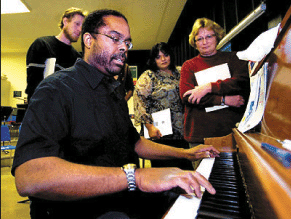Many that I talk to about their piano playing say that a very big fear is performing in front of others. Not only that, another huge fear is making a mistake when they are playing.
The question now becomes, how do you recover when you make mistakes?
Conventional wisdom tells us to keep playing, as if nothing happened. But, you know as well as I, that when you do make a mistake, the natural tendency is to stop and make a correction.
This is a very hard habit to break, and it does take quite a bit of practice to conquer this bad habit.
There are many ways to deal with mistakes. To avoid becoming overwhelmed by this, we will focus on a few.
I believe it was the great jazz trumpeter, Dizzy Gillespie that said "there are no wrong notes". I believe another jazz legend, John Coltrane said "you are only a half-step away from the right note".
Both of these statements bring up a very important point. You must change your way of thinking when playing in front of others.
When you perform, do not think of making mistakes. Instead, just think of having fun.
Let's face it. Mistakes happen. The best players even make mistakes. And, to the surprise of many, they can even make a lot of mistakes during the course of a song.
But, if you are listening when a mistake is made, you are not able to tell most of the time.
Let's look at a couple of solutions that many jazz players use to cover themselves.
Musicians from other genres of music may use these techniques also. But, since I am a jazz musician, I will use this reference.
The first solution is a very simple one. When you are playing, and hit a bad note, or group of notes, play the exact same note or group of notes again.
When you do this, the note(s) you play, sound like a definite idea. That is, it sounds as if you intended to play the note(s).
Not only that, when you listen to recordings, and hear musicians do this, you may notice that these ideas can be some of the most profound you will hear.
Now, that this secret has been exposed, you will probably be surprised at how often this happens.
Go back and listen to some of your favorite recordings.
You will soon discover that many of the people you think of as being great, use this technique frequently.
Another technique that works really well is to slide down, or go up a half-step from the first note you play, or the last note you hit.
Sometimes, you may start or end a tune on the wrong note.
Remember, you are only a half-step away from the right note.
So, if you accidentally start on the wrong note, try sliding your note a half-step down, or go up a half-step to play the note that you originally intended.
Similarly, if you end an idea on the wrong note, try going up or down a half-step from there to get to the note you wish to play.
To add another twist, try combining both of these techniques.
In other words, try going up or down a half-step to begin or end on the note you intended, and then play the entire idea again.
Until next time, continue to have fun on your piano journey!
To view my free online lessons, click here
If you would like to check out all of my podcasts (audio lessons online), click on one of the links below:
To access with iTunes
To access with Odeo (odeo/a899ff8db4f63f39)
to access with Podcast Alley
direct access to the RSS Feed
http://easypiano.com/eppodcast/pianolessons.rss
Have Fun!
Charley Wyser
easypiano.com
"When It's Easy, It's Fun!"
Tuesday, January 20, 2009
Play Piano: How To Recover From A Mistake
Subscribe to:
Post Comments (Atom)






when you listen to recordings, and hear musicians do this, you may notice that these ideas can be some of the most profound you will hear.
ReplyDeletepiano lessons